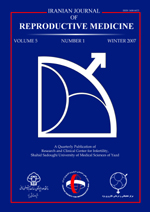
|
International Journal of Reproductive BioMedicine
Research and Clinical Center for Infertility, Shahid Sadoughi University of Medical Sciences of Yazd
ISSN: 1680-6433
EISSN: 1680-6433
Vol. 13, No. 11, 2015, pp. 673-678
|
 Bioline Code: rm15086
Bioline Code: rm15086
Full paper language: English
Document type: Research Article
Document available free of charge
|
|
|
International Journal of Reproductive BioMedicine, Vol. 13, No. 11, 2015, pp. 673-678
| en |
The frequency of follicle stimulating hormone receptor gene polymorphisms in Iranian infertile men with azoospermia
Gharesi-Fard, Behrouz; Ghasemi, Zahra; Shakeri, Saeed; Behdin, Shabnam; Aghaei, Fatemeh & Malek-Hosseini, Zahra
Abstract
Background: Azoospermia is the medical condition of a man not having any measurable level of sperm in his semen. Follicle stimulating hormone (FSH) is a member of the glycoprotein hormone family that plays an important role in human reproduction because of its essential role in normal spermatogenesis. Various Single Nucleotide Polymorphisms (SNPs) have been reported within FSH receptor (FSHR) gene that may affect the receptor function.
Objective: The present study aimed to investigate the correlation between two FSHR SNPs at positions A919G, A2039G, and susceptibility to azoospermia in a group of Iranian azoospermic men. The association between FSH levels within the sera and A919G and A2039G alleles and genotypes were also investigated.
Materials and Methods: This case control study was performed on 212 men with azoospermia (126 non-obstructive and 86 obstructive) and 200 healthy Iranian men. Two FSHR gene SNPs were genotyped using PCR-RFLP method. The relationship between FSH levels within the sera and A919G and A2039G alleles and genotypes were also investigated.
Results: Statistical analysis indicated that at A919G position, AA genotype and A allele were more frequent in obstructive azoospermia cases compared to non- obstructive or normal men (p=0.001). Regarding A2039G polymorphisms, no significant difference was observed between both azoospermia groups and the controls. The mean level of serum FSH was higher in the non-obstructive men compared to the obstructive patients (23.8 versus 13.8, respectively, p= 0.04).
Conclusion: The results of the present study indicated that the genetic polymorphisms in the FSHR gene might increase the susceptibility to azoospermia in Iranian men.
Keywords
FSH receptor; Male infertility; Polymorphism; Azoospermia
|
| |
© Copyright 2015 - Iranian Journal of Reproductive Medicine
Alternative site location: http://www.ijrm.ir
|
|
